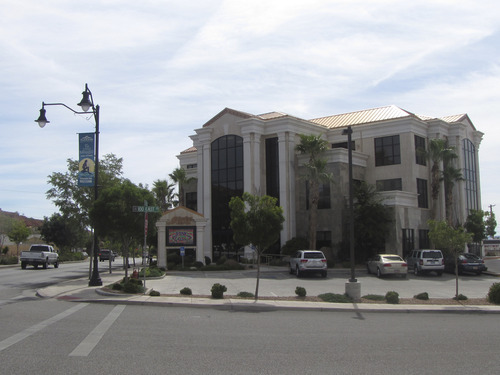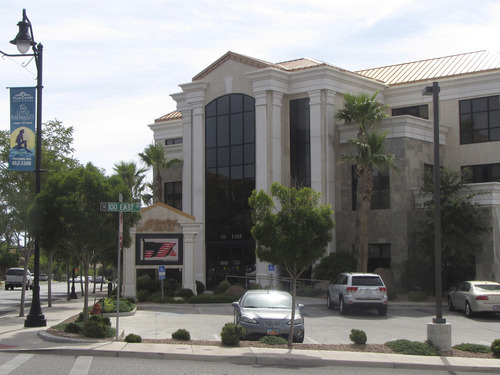This is an archived article that was published on sltrib.com in 2011, and information in the article may be outdated. It is provided only for personal research purposes and may not be reprinted.
For a bank of its size, SunFirst has an outsize number of headaches.
The biggest homegrown lender in St. George is caught up in a tangle of financial and legal predicaments appearing to flow from efforts to get through a crisis caused by home-building and land development loans that went awry following the mortgage meltdown in 2007.
Signs of credit troubles soon emerged. SunFirst's ability to absorb loan losses weakened noticeably between 2008 and the 2009, and in October of that year the Federal Deposit Insurance Corp. ordered the bank to immediately take steps to find more capital.
The order, still in force, seems to have put SunFirst on a path that resulted in a federal indictment last April of its vice chairman, John Campos, for allegedly arranging to process Internet poker transactions through the bank in return for a massive infusion of fresh capital .
The order also may have moved the bank to sell stock to Jeremy Johnson, the St. George businessman and philanthropist who now sits in the Davis County jail accused of mail fraud by a federal grand jury. The Federal Trade Commission also has alleged in a lawsuit that he defrauded consumers out of $275 million through a massive Internet marketing scam.
And with the bank's finances continuing to unravel, bank President John Allen has been demoted. Allen's successor, Gerry Smith, waits on the sidelines while the FDIC and Utah Department of Financial Institutions weigh whether to permit him to take over the top job. Meanwhile, the SunFirst board, presumably including Campos, is in charge of daily operations.
SunFirst board members and legal counsel declined to comment for this story. Regulators also refused to discuss the bank's woes. But an analysis of publicly available financial data shows SunFirst is struggling.
—
By the numbers • Despite the FDIC order to increase capital to at least 11 percent of assets (which consist mostly of loans), SunFirst's capital has fallen steadily since at least the beginning of 2010. It now stands at 6.2 percent of assets — little more than half of what regulators demanded 19 months ago.
Capital plays a critical role in the soundness of banks. It is a cushion against unexpected losses from loans that go bad. Because the equity of shareholders is at risk in the event of a failure, banks have a strong incentive to manage their capital carefully.
Campos is a shareholder. Contacted by The Salt Lake Tribune, Campos initially was eager to talk about his indictment by the U.S. Attorney for the Southern District of New York last spring. After consulting with his lawyer, however, Campos was unavailable.
According to the indictment, Campos was approached in September 2009 by Johnson and Las Vegas businessman Chad Elie, who also was indicted by federal authorities. While expressing some "trepidation," Campos allegedly agreed to process gambling transactions for PokerStars and Full Tilt Poker, two of the three largest Internet poker companies doing business in the U.S.
The deal would have been a home run for capital-starved SunFirst. In return for a $10 million investment and a $20,000 "bonus" payment to Campos, Elie and his partners would get a 30 percent ownership stake in the bank, according to the indictment.
The federal indictment said Elie and a partner, identified elsewhere as Johnson, made an initial investment of $3.4 million three months later, ostensibly giving them a 10 percent ownership stake. Regulators say someone who owns 5 percent of a bank's stock, or 10 percent of a bank holding company's stock, is an "insider,"giving him influence unavailable to smaller shareholders.
In a court document filed before the indictment, Elie said Johnson told him in the fall of 2009 that he had developed a "trusted" relationship with SunFirst. The relationship put Johnson in a position to assure Elie that SunFirst could process poker transactions. Federal officials say SunFirst processed more than $200 million in payments for PokerStars and Full Tilt Poker between December 2009 and November 2010.
It isn't clear how much SunFirst stock Johnson owns. Johnson has testified he bought $500,000 worth of stock in 2010. Whether he owns more is unclear.
In a deposition given to a Federal Trade Commission lawyer earlier this year, Johnson said his wife, Sharla, took out a line of credit for $3.4 million. Half was transferred to a family trust; the other half went to Johnson's brother, Andy. The trust and Andy Johnson used the money to buy shares in SunFirst. Johnson agreed with the FTC lawyer that SunFirst was asking for an infusion of capital when the deal was struck, according to the deposition.
—
Illegal? • Bank regulators who asked not to be identified said the stock purchase may not have been illegal since it was financed with a line of credit. Unlike other loans, it isn't necessary to tell a bank how the line of credit will be used.
Nevertheless, the deal raised eyebrows. One former regulator said it was akin to raising capital "through the back door."
Johnson's lawyer, Travis Marker, said SunFirst came to Johnson because it needed capital. Marker said Johnson and Elie had been contacted by Internet poker companies who wanted them to process their transactions. Johnson did not want to run afoul of federal law banning banks from processing gambling payments, so he solicited opinions from three law firms before acting, Marker said.
The firms said the reach of laws that govern poker payments is open to debate. They argue that poker games between individuals are primarily games of skill, not chance. As such, poker games don't add up to gambling.
"Based on the limited case law, the statutes and the legislative history, the firm believes that if the questions were litigated it is more likely than not that a court will find that [federal laws] are not violated by the processing of transactions on behalf of online peer-to-peer poker operators," according to an opinion written by Catherine Hanaway, a partner at a St. Louis law firm and a former U.S. Attorney for the Eastern District of Missouri.
—
Legal opinion • Hanaway's opinion addressed to SunFirst was emailed to a PokerStars official named Steve Kraut in July 2010, almost a year after Elie approached Campos. At the time, Kraut's email address was at pokerstars.com. Kraut now works for Rational Entertainment Enterprises on the Isle of Man, where gambling is legal.
Even so, Marker believes it was Hanaway's opinion and similar viewpoints by two other law firms that probably overcame the trepidation that federal authorities said Campos expressed to Elie before he consented to allow SunFirst to process poker payments, Marker said.
Marker said the processing also had at least tacit approval from the FDIC. He said Johnson has an email from the agency confirming it was made aware of the three legal opinions.
Lawyers familiar with the Campos indictment say his Salt Lake City lawyer, Neal Kaplan, may mount a defense based on the notion that peer-to-peer poker isn't a game of chance, and therefore is exempt from federal law.
If he takes that tack, Kaplan will tap into a widely held sentiment that the federal government has overreached in its efforts to crack down on online poker in the U.S. The subject is hotly debated in gambling circles. Many lawyers believe federal law does not directly address the regulation of online poker sites.
In June, Rep. Joe Barton, a Texas Republican, introduced a bill in Congress to protect people who play poker online. Cosponsors of the bipartisan bill include liberal Rep. Barney Frank of Massachusetts and libertarian Republican presidential candidate Ron Paul.
Meanwhile, SunFirst struggles to stay afloat. The bank has lost more than $12 million since the start of 2009, including a $1.1 million loss in the first quarter of this year as it continues to wrestle with defaulted real estate and construction loans.
pbeebe@sltrib.comTwitter: @SLTribPaul





